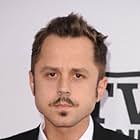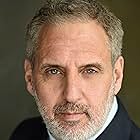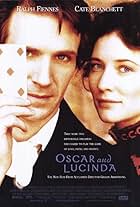PUNTUACIÓN EN IMDb
6,9/10
27 mil
TU PUNTUACIÓN
Una mujer se toma la justicia por su mano después de que la policía ignore sus súplicas para arrestar al hombre responsable de la muerte de su esposo, y acaba bajo arresto por asesinato y en... Leer todoUna mujer se toma la justicia por su mano después de que la policía ignore sus súplicas para arrestar al hombre responsable de la muerte de su esposo, y acaba bajo arresto por asesinato y enamorándose de un oficial.Una mujer se toma la justicia por su mano después de que la policía ignore sus súplicas para arrestar al hombre responsable de la muerte de su esposo, y acaba bajo arresto por asesinato y enamorándose de un oficial.
- Premios
- 6 premios y 7 nominaciones en total
Argumento
¿Sabías que...?
- CuriosidadesCate Blanchett jumped at the chance of shaving off her hair for the film, finding the experience to be very liberating.
- PifiasCrewmembers are briefly reflected in the front of a train as we see the main characters walk away from the train. Specifically, look for a man in a red tee-shirt.
- ConexionesFollowed by El infierno 2005 (2005)
- Banda sonoraFür Alina
Composed by Arvo Pärt
Performed by Alexander Malter (piano)
Produced by Manfred Eicher
ECM New Series
Courtesy of Universal Edition, Vienna
Reseña destacada
"How high can I fly", is the question Filippo (Giovanni Ribisi) asks during a helicopter flight simulation at the onset of Heaven, the latest film by Tom Tykwer, a question that does not become relevant until the end. Heaven raises the question of ends and means, specifically -- does a worthy end justify unacceptable means? It explores the answer in what is essentially an allegory about responsibility, transformation, and transcendence. Heaven was to be the first part of a trilogy by the late Polish director Kristov Kieslowski called Heaven, Purgatory, and Hell. Kieslowski, however, died in 1996 and was unable to complete it and the task of completion was given to Tykwer. Heaven merges the technical, fast-paced prowess of Tykwer with the slower-paced sublime poetics of Kieslowski and the result was, for me, a strange but deeply spiritual experience.
In Turin, Philippa Paccard (Cate Blanchett) an English teacher attempts to get even with an Italian drug dealer who caused one of her students to commit suicide. In trying to destroy what she perceives to be evil, she plants a bomb in his office wastebasket but the plan is thwarted and she inadvertently kills four innocent people in an elevator. Meanwhile, the drug dealer, Vendice is not harmed. Later when Philippa realizes the consequences of her actions and breaks down sobbing during an interrogation, she is comforted by carabinieri, Filippo (Giovanni Ribisi), who is in the room as her translator (she insists on testifying in English). Filippo is deeply attracted to the defendant and believes in her innocence. Together they formulate an escape that leads them to another act of revenge and finally into hiding in the Italian countryside where they become fugitives in the town of Montepulciano.
The film then shifts from a gritty reality-based drama to a dream-like poem about lovers on the run. Contrary to what one would expect, the lovers are totally calm and peaceful and resigned to their fate. The countryside where they are hiding is bathed in a glow that soaks everything in an ethereal light. Looking like innocent children out on a Halloween night, Philippa and Filippo identify with each other by shaving their heads and wearing identical clothes. The cinematography is wondrous. One of the most beautiful scenes is a faraway shot of the horizon and two shadowy figures coming together in silhouette next to a huge tree. I will never forget the radiance of Blanchett and the beatific look of love on the face of Ribisi.
On the surface, Kieslowski seems to be telling us that we are at the mercy of a capricious universe. We try to do good and we end up doing wrong. We have excellent plans but do not foresee the consequences. Underneath this, however, is Kieslowski's vision that everything happens for a purpose, one that only God is aware of. There is little dialogue, only hushed silence and passionate glances. "Heaven is about silence," Tykwer tells The New York Times. "But all the silences have ten layers".
The film to me does not justify criminal acts. Rather, it says that while some of us may commit acts that are reprehensible no matter how worthy our motives, all of us can ultimately achieve transformation. As director Tom Tykwer put it, `The film (Heaven) is about redemption, basically the concept that love can help us find our true perspectives and our true meanings. This is not about God being somewhere else, but in ourselves and what a gift that is." In an ending that is transforming for both the characters and the viewer, the two lovers take responsibility for their actions and surrender, in Beckett's phrase, to "the benign indifference of the universe". The meaning of the opening helicopter scene then becomes clear in an ascending epiphany of grace.
In Turin, Philippa Paccard (Cate Blanchett) an English teacher attempts to get even with an Italian drug dealer who caused one of her students to commit suicide. In trying to destroy what she perceives to be evil, she plants a bomb in his office wastebasket but the plan is thwarted and she inadvertently kills four innocent people in an elevator. Meanwhile, the drug dealer, Vendice is not harmed. Later when Philippa realizes the consequences of her actions and breaks down sobbing during an interrogation, she is comforted by carabinieri, Filippo (Giovanni Ribisi), who is in the room as her translator (she insists on testifying in English). Filippo is deeply attracted to the defendant and believes in her innocence. Together they formulate an escape that leads them to another act of revenge and finally into hiding in the Italian countryside where they become fugitives in the town of Montepulciano.
The film then shifts from a gritty reality-based drama to a dream-like poem about lovers on the run. Contrary to what one would expect, the lovers are totally calm and peaceful and resigned to their fate. The countryside where they are hiding is bathed in a glow that soaks everything in an ethereal light. Looking like innocent children out on a Halloween night, Philippa and Filippo identify with each other by shaving their heads and wearing identical clothes. The cinematography is wondrous. One of the most beautiful scenes is a faraway shot of the horizon and two shadowy figures coming together in silhouette next to a huge tree. I will never forget the radiance of Blanchett and the beatific look of love on the face of Ribisi.
On the surface, Kieslowski seems to be telling us that we are at the mercy of a capricious universe. We try to do good and we end up doing wrong. We have excellent plans but do not foresee the consequences. Underneath this, however, is Kieslowski's vision that everything happens for a purpose, one that only God is aware of. There is little dialogue, only hushed silence and passionate glances. "Heaven is about silence," Tykwer tells The New York Times. "But all the silences have ten layers".
The film to me does not justify criminal acts. Rather, it says that while some of us may commit acts that are reprehensible no matter how worthy our motives, all of us can ultimately achieve transformation. As director Tom Tykwer put it, `The film (Heaven) is about redemption, basically the concept that love can help us find our true perspectives and our true meanings. This is not about God being somewhere else, but in ourselves and what a gift that is." In an ending that is transforming for both the characters and the viewer, the two lovers take responsibility for their actions and surrender, in Beckett's phrase, to "the benign indifference of the universe". The meaning of the opening helicopter scene then becomes clear in an ascending epiphany of grace.
- howard.schumann
- 3 nov 2002
- Enlace permanente
Selecciones populares
Inicia sesión para calificar y añadir a tu lista para recibir recomendaciones personalizadas
- How long is Heaven?Con tecnología de Alexa
Detalles
- Fecha de lanzamiento
- Países de origen
- Sitio oficial
- Idiomas
- Títulos en diferentes países
- Heaven
- Localizaciones del rodaje
- Empresas productoras
- Ver más compañías en los créditos en IMDbPro
Taquilla
- Presupuesto
- 11.000.000 US$ (estimación)
- Recaudación en Estados Unidos y Canadá
- 784.399 US$
- Fin de semana de estreno en EE. UU. y Canadá
- 51.909 US$
- 6 oct 2002
- Recaudación en todo el mundo
- 4.251.037 US$
- Duración1 hora 37 minutos
- Color
- Mezcla de sonido
- Relación de aspecto
- 1.85 : 1
Contribuir a esta página
Sugerir un cambio o añadir el contenido que falta

Principal laguna de datos
What was the official certification given to Heaven, de Tom Tykwer (2002) in Spain?
Responde































